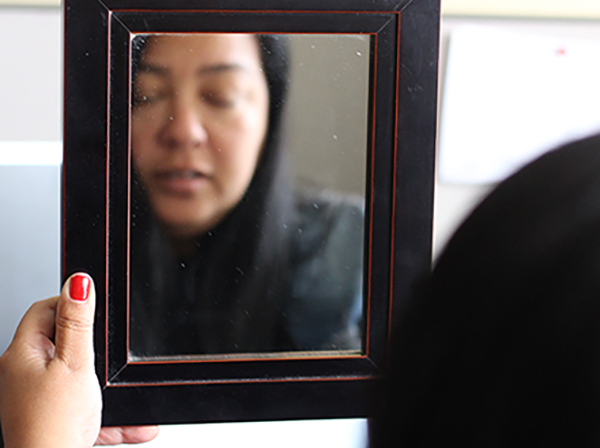by Becca Ehrlich
There was a job that I wanted, and I even had a sense that God was calling me to it. Needless to say, I was thrilled when I got an interview.
Colleagues and friends affirmed me, saying that my gifts and skills matched the job. I prayed about it, asking for God’s guidance. I researched the job, studying the field and talking to people who did the same kind of work. I went into the interview feeling prepared.
The interview went well. I even thought I detected a hint that the job was mine – all I had to do was wait for the phone call.
Finally, the phone rang — the call I’d been waiting for!
I did not get the job.
Rejection. It’s something we all experience at some point. Whether it’s rejection by a teacher, a family member, a significant other, a friend, a college, or a possible employer, rejection happens. And when it does, it can range from a mild inconvenience to emotional and financial devastation.
Rejection is not new. You’d think that we’d be complete pros at it by now – but that’s not so. Rejection can damage our self-worth and ruin our lives . . . if we let it.
An early experience of rejection can be found in the Bible in Genesis 4:1-16. It’s the story of Cain and Abel.
The two brothers gave their offerings to God. Farmer Cain brought things he had grown, and shepherd Abel brought some of his flock. God “looked with favor” on Abel’s offering, but God “did not look with favor” on Cain’s offering. In other words, God rejected Cain’s fruits and veggies.
Spoiler alert: Cain did not deal well with this rejection. He lured his brother Abel out into the field and killed him. Then Cain lied to God about the murder, but God knows that Cain killed Abel because, well, God knows everything. God exiled Cain to be a wanderer, but not before putting a “mark” on Cain so that he won’t be killed by others while he wanders.
Besides being tragic, this Bible story teaches us helpful things about rejection:
Rejection brings up emotions. Cain has a strong emotional reaction to God’s rejecting his offering: “So Cain was very angry, and his face was downcast” (s. 5). Anger and disappointment (and some envy) fuel Cain’s terrible actions later in the story.
 My own emotions around rejection almost made me say no when I was asked to write this article. Rejection doesn’t feel good. People don’t like to be rejected. Just watch any reality TV show where suitors compete for a rose (and another date). When the contestants are sent home, they are almost always emotional. This mirrors our own experiences of rejection. We may not be rejected on national TV, but that doesn’t make it any less of a big deal or any less emotional. Being rejected hurts.
My own emotions around rejection almost made me say no when I was asked to write this article. Rejection doesn’t feel good. People don’t like to be rejected. Just watch any reality TV show where suitors compete for a rose (and another date). When the contestants are sent home, they are almost always emotional. This mirrors our own experiences of rejection. We may not be rejected on national TV, but that doesn’t make it any less of a big deal or any less emotional. Being rejected hurts.
Rejection causes uncertainty. When Cain and Abel gave their offerings to God, they both knew the system. They give offerings to God, God accepts the offerings, all is well. But then God threw a curveball and rejected Cain’s offering. This threw Cain for a loop, and he found himself thrown into uncertainty and confusion.
We all like predictability and certainty. We like to know how things will turn out. When we are rejected, as Cain was, we are thrown into uncertainty and confusion. And because of the rejection, we can start to question everything we know, even things we were sure of before. Which brings us to . . .
Rejection causes us to question our identity. When God rejected Cain’s offering, Cain was not only angry and disappointed—he was unsure of who he was anymore. Cain gave the offering because he thought he was doing the right thing. He thought he was a good person. So now he’s not only emotional and uncertain—he’s not even sure who he is anymore.
 When we encounter rejection, we question who we are. If we are rejected by a significant other, we question who we are without them, and what in us caused the rejection. If we are rejected by a potential employer, we question if we should even be doing that type of work. If we are rejected by a college or university, we question what we are meant to do, and what our path in life should be. Rejection hits us right in our existential core.
When we encounter rejection, we question who we are. If we are rejected by a significant other, we question who we are without them, and what in us caused the rejection. If we are rejected by a potential employer, we question if we should even be doing that type of work. If we are rejected by a college or university, we question what we are meant to do, and what our path in life should be. Rejection hits us right in our existential core.
Left unresolved, rejection can lead to tragedy. Because Cain did not work through his emotions, uncertainty, and identity crisis, he ended up killing his brother.
That’s an extreme example, but when we don’t work through our own emotions after a rejection, it can lead to tragedy in our own lives. We can lash out at loved ones or feel like we don’t matter anymore. We can start making bad decisions that have long-lasting consequences for ourselves and others around us.
So, when we are rejected, what helps?
God’s grace. Even after Cain killed his brother Abel and had to live with the consequences, God marked Cain so that he wouldn’t be killed. God’s grace is all the good that comes from God (salvation, love, mercy, peace, and so much more) through no work of our own, with no strings attached. Cain did not deserve to be saved by God–but that’s God’s grace.
Even in rejection, God is there. We have a God who knows what rejection feels like, who lived through the ultimate rejection. Rejected by friends, followers, and his people, Jesus was put to death on a cross. But God worked through that cross and brought resurrection to Jesus and to all who follow him.
Being a Jesus follower means dealing with rejection, as Jesus did. But it also means that Jesus and God’s grace are with us amid that rejection. With God’s help, we can work through our reactions to rejection. We can work through our emotions, the uncertainty, the identity crisis, and avoid tragedy—because our God knows what rejection is like and can help us through it.
Jesus turns the uncertain certain. Jesus reminds us that our identity is that of beloved children of God, not whatever we think the world thinks of us. Jesus helps us to use our emotions productively rather than hurting others. And Jesus helps us avoid tragedy in our response to rejection.
We will experience rejection, but Jesus is the “stone which the builders rejected” and he “has become the cornerstone” (Acts 4:11). With Jesus, the God of rejection and resurrection as our foundation, we too are resurrected after rejection. We have hope in Jesus Christ.
Closing prayer:
God, we thank you for sending your son Jesus to us to show that rejection is not the final word. Help us to be aware of Jesus’ presence when we are rejected. In Jesus’ name, we pray. Amen.
Discussion questions:
1. Think of a time you experienced rejection. How did you react? How did God help you through that rejection?
2. Can you think of a real-world example of rejection leading to tragedy? How could the outcome have been different?
3. How will you deal with rejection in the future, knowing that Jesus himself experienced rejection and is with you when you are rejected?
 Becca Ehrlich is a Lutheran pastor in Philadelphia. She blogs about minimalism from a Christian perspective at www.christianminimalism.com
Becca Ehrlich is a Lutheran pastor in Philadelphia. She blogs about minimalism from a Christian perspective at www.christianminimalism.com


These are powerful thoughts and suggestions, Becca! Thank you for sharing your vulnerability.
Hello Becca
I needed this word today. I’m experiencing rejection on many different levels and needed this reminder that God’s grace is in rejection. Thank you Jesus!
Good word. Be inspired Pastor!
This is very uplifting!! We’ve all experienced rejection of some degree..which hurts. Hurt causes anger & we need reminders on how to handle anger.
This is a Great artical it’s speaking Alot in my life.
I am a pastor in Kenya and have suffered so much on rejection.
I am happy to learn more about overcoming rejection
I would love to help many people in Kenya and Africa encountering rejection.
Welcome to kenya we can vist churches school and prisons hear and rescue souls
Hoping to hear from you c
Soon
I love playing bridge. Besides playing “party “ bridge, 1d/wk, I play duplicate also to get more games and practice in. I play 5 on a 10 in my mind and in true results of games I often am last or close to last. You have to play w/a partner and it could be in my looks at things,but being chosen to be a partner hasn’t happened and I have asked people who don’t know me or are desperate like me. This is ongoing and I get very sad and paranoid. People like me and are nice and aren’t mean. I study a lot and take lessons— playing on line isn’t enjoyable for me. I am an RN— but I am retired and I need the social life. I have a lady who is a very good player who needs a partner and we are going to talk about playing together. I feel like I need to be honest with her and maybe get her and Royal and Peirce she doesn’t enjoy playing with me. Any thoughts on this? I am Catholic and I do believe That God is there to help but here than words from someone often helps me in the Interim. This is been swirling in the wind for about a year and a half or two years it’s just wrapping up and goes down. I would appreciate any words that may make some sense to me. Thank you very much.
Starting a new Sunday School year and the story of Cain and Abel is our second lesson. Very interesting insight. Made me think and look at the story in a different way. I am teaching teens and rejection is a very real and traumatic part of these years. It is hard to deal with. If not dealt with it can even lead to suicide
Rebecca
Thank you for sharing
Your commentary hit home.
Very thoughtful and helpful.
Difficult subject well addressed.
THANK YOU.
JESUS INDEED KNOWS ABOUT REJECTION AND HE CAN AND WILL HELP US THROUGH OUR PERIOD OF REJECTION.
Facing rejection by every which way including my own Pastor. It’s sad as a Pastor, he didn’t even “care”, called or prayed over my two strokes. Also facing rejection by my own wife of 30+ years and children even many of the jobs I’ve applied for. I live because of God and he will have to take my life (I will never commit suicide) which he owns. Rejection is HARD!
I serve as church organist for almost 45 years now and served in the last 8 years in this church. Never in a million years would I thought of being rejected by the Pastor. At one point, I was credited for raising the level of worship music to a higher level. I’ve done a lot for the church. Being REJECTED by the Pastor because of his personal reasons sucks.
The article didn’t give me comfort for I feel like Cain where my “offerings” to God feels being rejected. I’ll continue to find peace. Pray for me.
Thank you for sharing. I really need this at this hour. God bless.
Thank you for your thoughtful article. it is nice to hear from someone who has been in the trenches, and doesn’t just brush off the pain with pat answers. it is much harder to experience rejection in the Church….from a senior pastor. I have held a role of being a volunteer assistant to my pastor for years, and when I resigned that role, my pastor said to my face with full explanation why he and his wife are NOT my friends. After years of loyalty, devotion and much time and thought given in helping, this was a devastating blow that I am still reeling from. My entire family still goes to the Church, as we are all so involved there. Every Sunday is such pain.
Awesome and thanks for sharing. I truly needed this today.